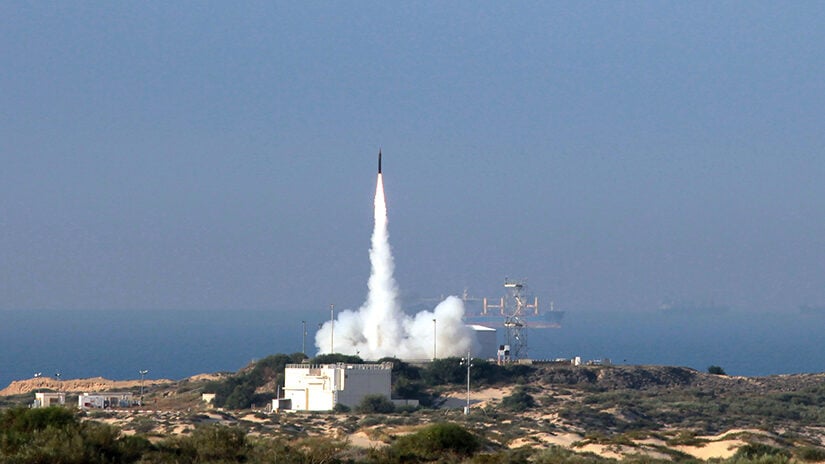
An Arrow 3 is tested by IAI. (IAI)
TEL AVIV — With Germany now reportedly in talks to buy Israeli-made air defense systems, there is hope inside Israeli defense firms that a new spending-splurge on defense equipment may be coming from Europe. But the firms are also keeping a wary eye on what pressure Washington may bring to the European nations to instead buy American.
In public comments while meeting with German Chancellor Olaf Scholz Sept. 12, Israeli Prime Minister Yair Lapid declared that Israel “will be part of the construction of Germany’s new defense force, mainly in the field of air defense. Scholz, for his part, called the Arrow 3 a “high-performance offer;” a German source told Reuters that there is a “plan” to buy Arrow 3 but that specifics have not been worked out.
Such a sale, if it happens, would be the first time Israel has exported the Arrow to another country. And given Germany’s central role in Europe and the continents defense spending increase in the wake of Russia’s invasion of Ukraine, a deal could potentially drive other nations interested in integrating on air defense with Berlin to also purchase the system.
Produced by Israel Aerospace Industries (IAI) with funding from the US, the Arrow 3 is targeted at ballistic missile defense. Because the US provides money, it can veto any export of the system, but sources here say Washington has given its tacit approval for a sale to Germany if Berlin and Jerusalem can come to terms.
One Israeli senior defense official said that other European countries are already in negotiations with the Israeli ministry of defense and defense industries about systems that can upgrade their capability to defend themselves from Russian missiles. While air defense is the priority, other systems are also on the hastily prepared shopping list.
The senior source added that Poland, Romania and at least some of the Scandinavian countries are already talking with “the right people” in Israel about fast acquisitions.
RELATED: Upgraded Arrow-3 test has kinetic kill on simulated Iranian ballistic missile
The only other major Israeli-made air defense systems under contract with Europe is in the Czech Republic, whose ministry of defense decided to purchase four Rafael-made Spyder batteries in 2012, including radars produced by IAI, in a contract valued at roughly $520 million. The agreement includes the involvement of Czech defense industries. Both the Spyder and Barak MX systems are also being evaluated by Romania.
A presentation of Rafael’s Spyder and Iron Dome has been scheduled for early 2023, per the source; that would occur at Rafael’s test ground in southern Israel.
IAI and Rafael declined to comment, as did the Israeli ministry of defense.
While Israeli industry may be licking their lips at the chance for a big influx of cash from Europe, they are doing so with the understanding that Washington could tip the scale towards American firms instead.
That the US could encourage European nations to buy American is hardly new; there is a long tradition of nations backing their domestic arms producers in competitions, and DC is hardly a stranger to that. The hope for Israeli industry, then, is that they are still able to land sales even as some portion of increased European budgets inevitably flow towards the US (and Europe’s own domestic companies.)
“It is very likely that pressure will be put by Washington on some proposed contracts,” predicted Amos Yadlin, a retired Israeli military officer and former head of the intelligence directorate. “ It will not be an across-the-board effort to undermine business with Israeli companies, but some proposed deals with Israeli companies will bring opposition from Washington.”
A former high-ranking official in one of Israel’s main defense companies said that American pressure should be anticipated when European countries re-arm, noting “At the end of the day, the European countries will buy what they think is the best solution.”
One nation unlikely to be buying Israeli weapons, even if there is interest, is Ukraine. Jerusalem made the political decision early this year not to sell advanced anti-tank missiles to Ukraine, in order not to disrupt the fragile arrangement allowing Israel to attack Iranian-related targets in Syria, a country controlled by Russia.
Kyiv has long shown interest in acquiring Israeli military equipment, particularly UAVs and communications outfits. However, in 2014, a deal between Kyiv and Israel drone maker Aeronautics was blocked by Russia and since then Ukraine has not officially received any military-technical assistance from Israel.
According to a defense source, the sensitive relations between Israel and Ukraine brought the Israeli ministry of defense to put strict “end user” regulations on countries like Estonia, Latvia and Lithuania, NATO members that purchased big numbers of the Spike missile manufactured by Israeli companies. As Breaking Defense previously reported, the three Baltic nations have been warned not to try and transfer the weapons to Ukrainian hands.
Air Force picks Anduril, General Atomics for next round of CCA work
The two vendors emerged successful from an original pool of five and are expected to carry their drone designs through a prototyping phase that will build and test aircraft.


























